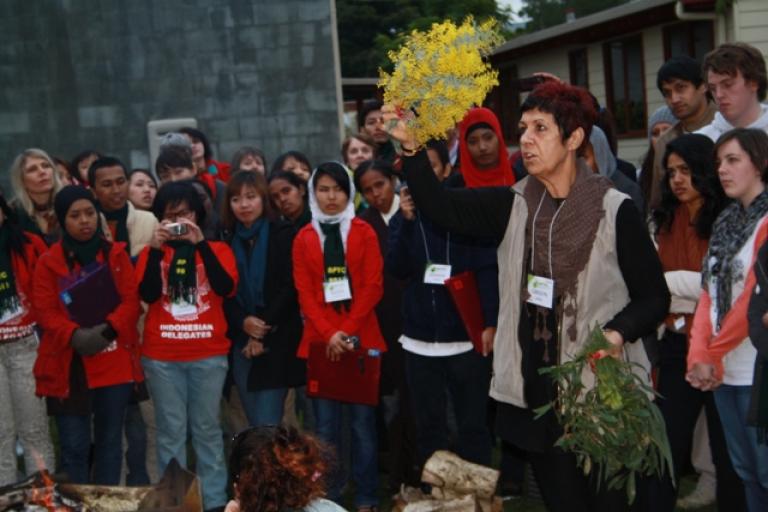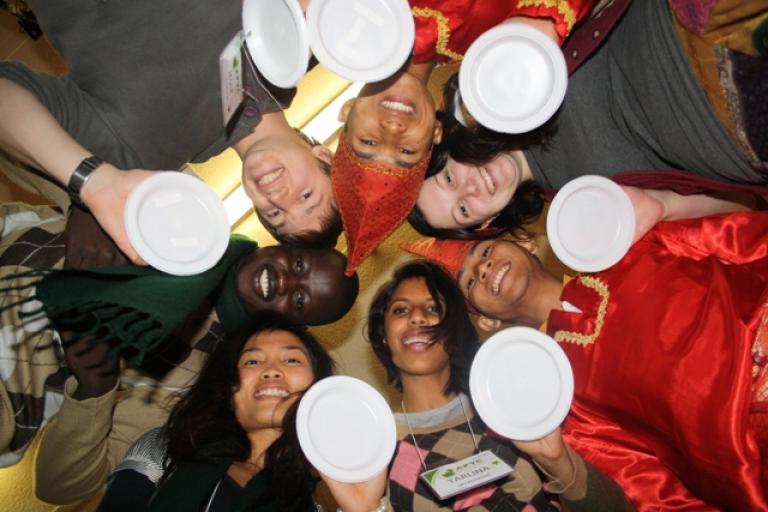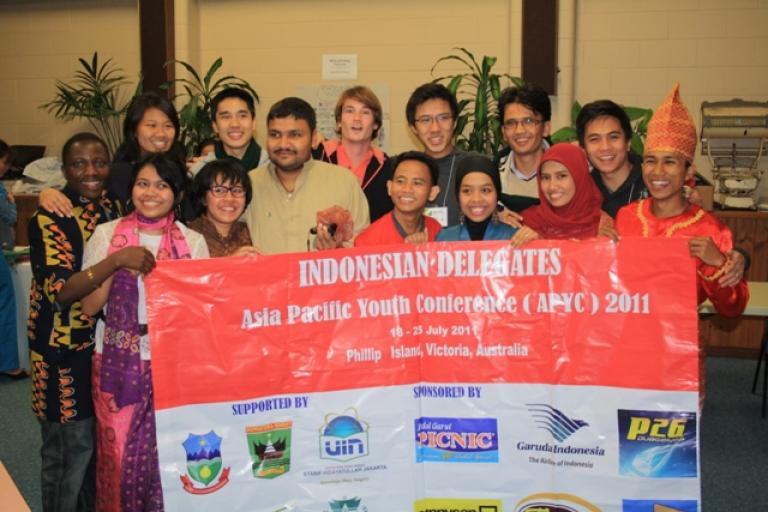Report by Bek Brown, edited by Mike Lowe

From the Solomon Islands to South Korea, 136 delegates from over 17 countries gathered on Phillip Island, near Melbourne, Australia, for the 17th in a series of Asia Pacific Youth Conferences (APYC) organized by Initiatives of Change, 18-24 July 2011.
The theme of the conference was ‘Action for Global Change through Personal Transformation’ and was illustrated by many examples showing that ‘big things swing on very small, personal changes’ or put simply, when people change situations change.
As the first APYC to be hosted in Australia, it was appropriate to start with a traditional ‘smoking ceremony’ and ‘welcome to country’ led by Aunty Carolyn Briggs, an Aboriginal Boonwurrung woman. (‘Aunty’ and ‘Uncle’ are titles of respect given to senior indigenous leaders). Aunty Briggs spoke about the need to focus not people’s differences but on what they have in common, urging the audience to learn from the people who have gone before and to celebrate our strengths and beliefs. ‘You, our young people, are our future... You will bring the change,’ she said.
Nine young Aboriginals took part, including three from Tennant Creek, a small community in Northern Territory. An evening showcasing some of their cultures – traditional dance, music and language – was a highlight of the conference as non-Indigenous Australians and international guests learnt about the land from its traditional owners.

The need to know ourselves – our strengths and our weaknesses – was a theme throughout the conference. Keynote speaker, Monique Toohey, stressed this saying, ‘When you know your strengths you become more resilient. You’re more able to see the opportunities around you and go for them. When you align your strengths with the needs around you, you will enhance your own wellbeing’. She added, ‘Contribution comes long before leadership. The reality is not all of us will become leaders, but we can all be contributors and we should never underestimate our contribution to the world”.
Facilitators, Nigel Heywood and Syahrul Azmi, introduced the practice of a daily ‘quiet time’ as a space for empowerment and a tool for liberation. Alongside this, the core values of absolute honesty, purity, unselfishness and love were offered as a framework to help understand our lives. For many of the participants it was their first experience of a ‘quiet time’. Yet by the end of the week many had committed themselves to practicing it each day. One young Australian said how grateful she was for the chance to look at her inner-self and explore her ‘unique purpose on this earth’.
Two plenary sessions titled ‘Experiments in Practical Change’ introduced six outstanding individuals, examples of what it means to be a change-maker. (See attached PDF file for their stories)

Many inspiring stories were shared by people who have already taken the first steps towards building a better world: Youth from the Mekong region who have created a Cambodia/Thailand Exchange Program (CTEP) to break down the barriers and prejudices between their two countries and other neighbouring countries; South Sudanese who have been through hell due to decades of war, now declaring, ‘While I’m still alive, I will do whatever I can to stop someone else from going through what I went through’; the six enthusiastic young Indonesians bursting with ideas and passion to make a difference in their country and communities. And so many others…
And then there were those whose hearts were changed over the course of the week: A young man from Thailand whose hatred of Pakistani people was challenged through meeting a Pakistani who was in his ‘family’ group at the conference – and as a result committed himself to being more understanding and forgiving; A young Indigenous woman who said, ‘It feels I was meant to be here. I have realised the direction I want to have in my life’; A Muslim Indonesian whose prejudice towards Jews was shaken after getting to know a Melbourne Jewish woman, and returned home determined to share what she had experienced in the hope of breaking down such prejudices in others.
A young Burundian living in Melbourne, shared from his heart, ‘I lost my family when I was little. I am half Hutu and half Tutsi – this is the first time I have told people who I am, because of the issues in Burundi/Rwanda. I have never joined the community in Melbourne because they ask me who I am - Hutu or Tutsi? I have decided to let them know that I am both and to join them and contribute what I can.’
The final plenary heard many more decisions like these. Many more brave souls who stood in front of a packed room and shared, with conviction, their commitment to bring change starting in their own lives. Some of these changes are crystalizing into concrete projects, with a team of enthusiastic APYC ‘graduates’ in Melbourne giving support.
The organisers of APYC were grateful to receive a number of generous contributions towards the conference costs from many individuals and organizations, including funding from Federal, State and local government bodies. In total almost $60,000 was donated.
Click here to see the video produced by the videomaking workshop during APYC

